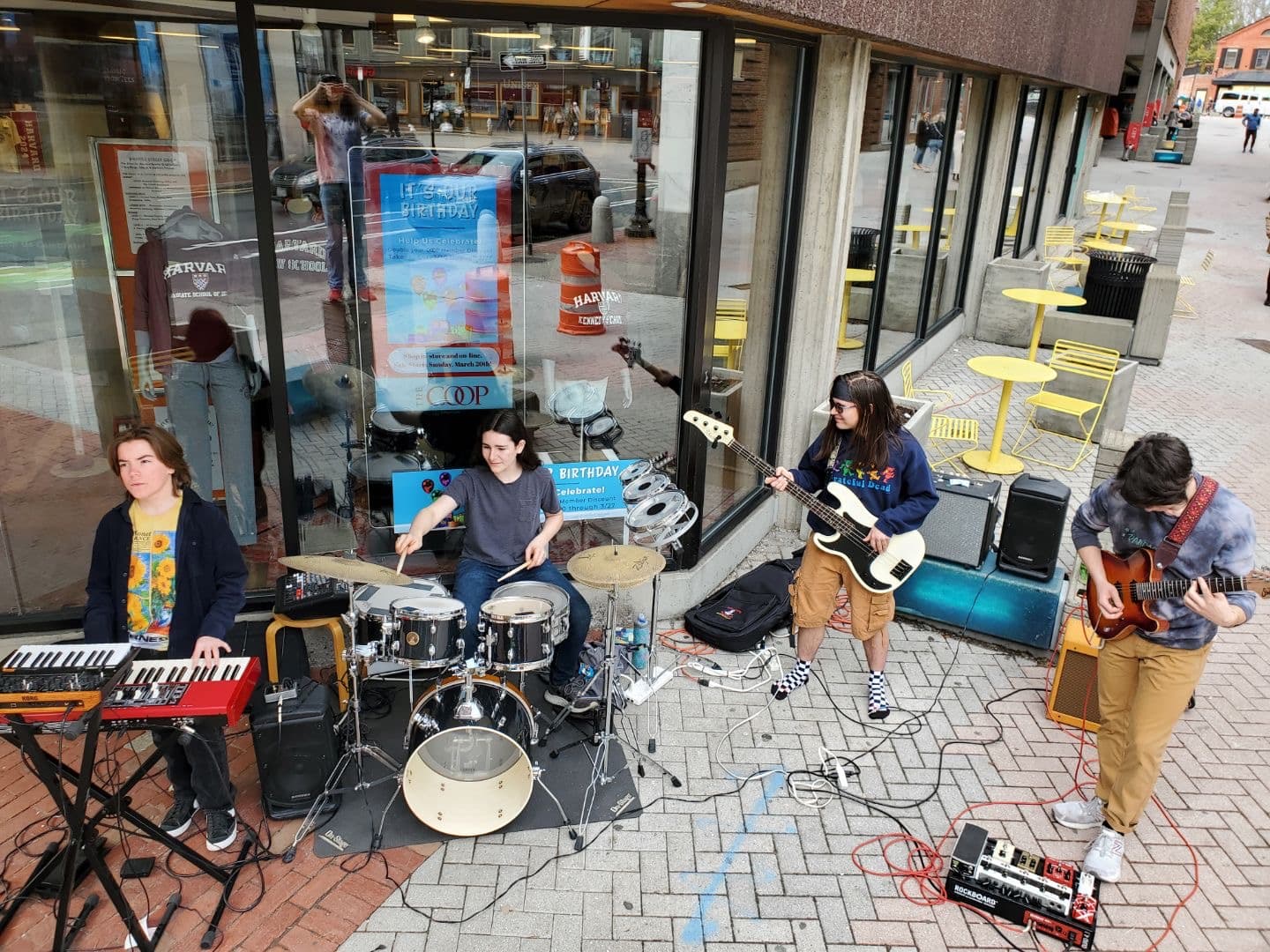Yes, a piano can be part of a band. It often adds melody and harmony to the group’s sound.
Pianos bring a versatile and dynamic element to the band setting, fitting into a variety of genres from jazz to rock. Their wide range allows for the creation of rich textures and complex arrangements, making them a staple in many musical groups.
Bands frequently utilize the piano’s capacity to provide rhythm and depth, enhancing their overall musical expression. The instrument’s iconic status stems from its ability to blend seamlessly with other instruments, making it a beloved choice for musicians seeking to enrich their sound. Its presence in a band can dramatically elevate the live performance experience for audiences around the world.
The Role Of Piano In Various Musical Genres
Welcome to a melodious journey exploring the dynamic role of piano in bands across diverse musical landscapes. Whether it’s jazz, rock, or classical, the piano’s presence is unmistakable and transformative.
Historical Context Of Piano In Bands
The piano’s roots in ensemble music date back centuries. Initially seen more in classical circles, the piano seamlessly transitioned into other forms of music. As popularity in piano grew, so did its presence in bands worldwide, ranging from saloons to grand concert halls. During the rise of jazz in the 20th century, the piano became a centerpiece, playing both rhythm and lead. This period marked the beginning of the piano’s journey as a band staple.
Piano’s Versatility Across Genres
The piano has earned its place as a chameleon in the musical world. Its ability to adapt to various musical styles is unparalleled. Let’s break down its role across different genres:
- Jazz: The piano provides the harmonic foundation, while also weaving improvised solos that define the genre’s essence.
- Rock: From ballads to high-energy tracks, it adds depth and excitement to the music.
- Classical: The pianist often takes the lead, commanding attention with complex compositions.
- Pop: Catchy hooks and melodies benefit from the piano’s rhythmic and melodic support.
- Blues: It delivers soul-gripping riffs, setting the scene for heartfelt storytelling.
- Country: Pianos lace songs with a homespun, sentimental feel that defines the genre.
Credit: musescore.com
Pianos And Keyboards: Complementing The Band Setup
Pianos and keyboards bring a unique flair to any band. They can create a wide range of sounds. These sounds set the mood, fill the space, and support the other instruments. Let’s dive into how both acoustic and electronic keyboards fit into modern band setups.
Distinction Between Acoustic And Electronic Keyboards
Acoustic pianos are the classic choice with rich, natural sounds. They have hammers and strings inside. They create sound that fills a room. Electronic keyboards, on the other hand, are versatile. They simulate different instruments. They are portable and ideal for varied venues.
| Acoustic Piano | Electronic Keyboard |
|---|---|
| Rich, organic sound | Wide range of sounds |
| Heavy and stationary | Light and portable |
| Requires tuning | Always in tune |
| No volume control | Adjustable volume |
Integrating Pianos With Modern Band Equipment
To blend pianos with a band, you need the right setup. Start with positioning the piano. Ensure it’s not overshadowing other sounds. Use microphones or pickups for acoustic pianos to mix their sound. Connect electronic keyboards to an amplifier or PA system. Balance their volume with other instruments.
- Position the piano for the best sound blend.
- Use mics or pickups for acoustic pianos.
- Connect keyboards to amps or PA systems.
- Balance the volume with the rest of the band.
Mixing equipment is also critical. Use a soundboard to control levels. Apply effects to enhance the keyboard’s role. Choose sounds that complement the songs. Remember, the goal is harmony among band elements.
// Example setup code for electronic keyboard
keyboard.connectToAmp(); // Connect keyboard to amplifier
keyboard.adjustVolume(); // Set the desired volume
keyboard.chooseEffect("Reverb"); // Add an effect
A soundboard manages all sounds. It ensures the keyboards work well with guitars, drums, and vocals. This balance is what makes a band performance memorable.
Famous Bands That Incorporate Piano
Think of the bands that shaped the sound of music. Many had a secret weapon: the piano. This versatile instrument has found its way into multiple music genres. Let’s explore how some legendary and modern bands have shown that the piano is much more than just a solo showpiece.
Classic Rock Bands And The Piano
The piano has been a cornerstone in the sound of classic rock. Bands like The Beatles and Queen often featured the piano. It added depth to their music.
The Rolling Stones used piano to create iconic intros. Elton John built a career with his piano-driven hits. Billy Joel, known as the “Piano Man,” also comes to mind. And who could forget Ray Manzarek of The Doors? His electric piano riffs are legendary.
| Band | Famous Piano-driven Song |
|---|---|
| The Beatles | “Let It Be” |
| Queen | “Bohemian Rhapsody” |
| The Rolling Stones | “She’s A Rainbow” |
| The Doors | “Riders on the Storm” |
Contemporary Groups Featuring Keyboardists
In the world of modern music, the keyboard continues to be essential. Artists such as Coldplay and Keane have notable keyboard-based sound. The piano sets their tunes apart.
- Imagine Dragons often weave keyboard into their music.
- Maroon 5 uses keyboards to add a pop of color to their hits.
- Arcade Fire and The National include keyboards for a rich, full sound.
The piano drives the melodies in many of Adele’s powerful songs. This shows its influence in pop music too. Bands like The Lumineers also incorporate it into their indie folk sound, making it a truly cross-genre instrument.
Challenges Of Including Piano In A Band
When a pianist joins a band, excitement fills the air. Yet, alongside the musical possibilities, challenges arise. Bands must think about moving a large instrument and blending its sound with others. Let’s dive into the hurdles a piano adds to a group.
Logistical Considerations For Touring
The piano’s sizable frame and delicacy mean touring gets trickier. Bands have to plan for:
- Transport: Moving a piano requires special vehicles and careful handling.
- Setup Time: Pianos take longer to set up and tune, demanding more prep time before shows.
- Space: A piano needs a lot of room on stage and in transport, which could limit venues.
Balancing Sound Among Instruments
Getting the piano to blend in with a band is no small feat. Musicians must work on:
- Volume Levels: The piano should be audible but not overpowering.
- Sound Quality: The piano’s tone must match the band’s vibe.
- Frequency Range: Pianos cover a wide range, which might clash with other instruments.
Bands are tasked with mastering the sound puzzle to ensure a harmonious performance.
Maximizing The Piano’s Impact In A Band
The piano can be much more than background music in a band. It holds the power to lift melodies and enrich harmonies. In a band, the piano has the potential to be the heart of the music. Maximizing the piano’s impact is key for a memorable performance. Let’s dive into how to elevate the piano’s role effectively.
Arrangement Techniques
To make the piano stand out in a band, it’s essential to master arrangement techniques. These methods shape how the piano interacts with other instruments. They can transform the role of the piano from supportive to starring.
- Dynamic Layering: Adjust the piano’s volume to complement others.
- Counterpoint: Create intertwining melodies for a rich texture.
- Pedal Points: Use sustained notes to anchor a piece.
- Rhythmic Diversity: Vary rhythms to spark interest.
Innovative Piano Playing Styles
Innovative playing styles can make the piano a band’s centerpiece. Pianists can experiment with different genres to find their unique sound.
| Style | Description |
|---|---|
| Blues | Deep grooves with a soulful touch |
| Jazz | Complex chords and spontaneous solos |
| Classical | Elegant and intricate melodies |
| Rock | Driving rhythms with powerful chords |
By blending these playing styles, the piano brings a unique voice to the mix. It can connect with listeners on a different level. Embrace the piano’s versatility in your band to see its full potential shine.

Credit: jazzpianoschool.com

Credit: www.harvardsquare.com
Will Using Pledge on a Piano Affect its Sound Quality for a Band Performance?
Using pledge on piano cleaning is not recommended as it can affect the sound quality. The chemicals in the product may leave a residue on the keys and strings, impacting the instrument’s performance. It’s best to use specialized piano cleaners to maintain the sound quality for band performances.
Frequently Asked Questions Of Can Piano Be In A Band
Can You Play Piano In Band?
Yes, you can play the piano in a band. It often serves as a versatile instrument for rhythm, harmony, and melody.
Is A Piano Part Of A Band?
A piano can be part of a band, often adding melodic and harmonic depth to the music. It is not a staple in every band but is common in genres like jazz, rock, and pop.
Can There Be A Pianist In A Rock Band?
Yes, rock bands can include a pianist. The piano adds versatile melody and rhythm to rock music compositions.
What Do You Call A Piano Player In A Band?
A piano player in a band is commonly referred to as a keyboardist or pianist.
Conclusion
Embracing the versatility of the piano opens a new realm of musical fusion. The piano’s rich tones can elevate any band’s sound, proving that yes, it’s a perfect fit. Whether it’s rock, jazz, or pop, a piano’s touch can transform melodies and harmonies.
So go ahead, let those keys sing in the ensemble.
{ “@context”: “https://schema.org”, “@type”: “FAQPage”, “mainEntity”: [ { “@type”: “Question”, “name”: “Can you play piano in band?”, “acceptedAnswer”: { “@type”: “Answer”, “text”: “Yes, you can play the piano in a band. It often serves as a versatile instrument for rhythm, harmony, and melody.” } } , { “@type”: “Question”, “name”: “Is a piano part of a band?”, “acceptedAnswer”: { “@type”: “Answer”, “text”: “A piano can be part of a band, often adding melodic and harmonic depth to the music. It is not a staple in every band but is common in genres like jazz, rock, and pop.” } } , { “@type”: “Question”, “name”: “Can there be a pianist in a rock band?”, “acceptedAnswer”: { “@type”: “Answer”, “text”: “Yes, rock bands can include a pianist. The piano adds versatile melody and rhythm to rock music compositions.” } } , { “@type”: “Question”, “name”: “What do you call a piano player in a band?”, “acceptedAnswer”: { “@type”: “Answer”, “text”: “A piano player in a band is commonly referred to as a keyboardist or pianist.” } } ] }As an Amazon Associate, Cleanestor earns from qualifying purchases at no additional cost to you.

